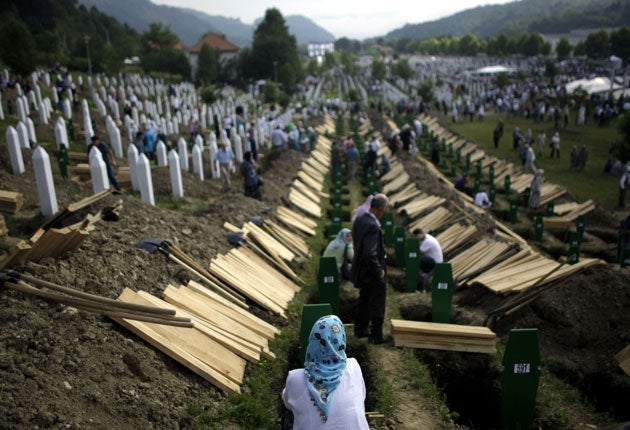15 years on, thousands bury victims of Srebrenica

Your support helps us to tell the story
From reproductive rights to climate change to Big Tech, The Independent is on the ground when the story is developing. Whether it's investigating the financials of Elon Musk's pro-Trump PAC or producing our latest documentary, 'The A Word', which shines a light on the American women fighting for reproductive rights, we know how important it is to parse out the facts from the messaging.
At such a critical moment in US history, we need reporters on the ground. Your donation allows us to keep sending journalists to speak to both sides of the story.
The Independent is trusted by Americans across the entire political spectrum. And unlike many other quality news outlets, we choose not to lock Americans out of our reporting and analysis with paywalls. We believe quality journalism should be available to everyone, paid for by those who can afford it.
Your support makes all the difference.Weeping among endless rows of coffins, tens of thousands gathered yesterday in the eastern Bosnian town of Srebrenica to bury hundreds of massacre victims on the 15th anniversary of the worst crime in Europe since the Nazi era.
A whole hillside was dug out, with graves waiting for 775 coffins to be laid to rest at the biggest Srebrenica funeral so far. Still, that was less than a tenth of the total number of Muslim men and boys executed after Serb forces overran the UN-protected town on July 11, 1995, during the 1992-1995 Bosnian war.
At the time, some 30,000 Bosnian Muslims had flocked to the United Nations military base in the town's suburb of Potocari for refuge. But when Serb forces came, outnumbered Dutch troops opened the gates. The Serbs separated out men and boys, putting them on trucks and carting them away, the vast majority never to be seen again.
The Srebrenica memorial centre now stands across the road from that former UN base. The bodies being buried yesterday were previously excavated from mass graves and identified through DNA tests.
An estimated 60,000 people were at the memorial yesterday. Relatives mingled among the pits on one side and rows of green coffins on the other, looking for the names of their loved ones.
Muslim prayers and weeping mixed with speeches of dignitaries condemning the crimes and calling for the perpetrators to be punished.
Fifteen years later, no one represented the UN at the ceremony. Serbian President Boris Tadic was the first dignitary to arrive, saying he was coming in an "act of reconciliation".
"[I want to] build bridges of trust and understanding among the nations in the region," he said in Belgrade. In Srebrenica, some in the crowd yelled "Bravo, Boris!", others asked: "Where is Mladic?" – a reference to former Bosnian Serb general Ratko Mladic, who led the Serb troops into Srebrenica.
"I wish to welcome you, we are receiving you in peace," said Kada Hotic, a representative of the Srebrenica widows, while Mr Tadic held both of her hands. Bosnian Serbs sent no representatives to yesterday's ceremony. In a deliberate snub, the Serb Democratic Party instead honoured its founder, Radovan Karadzic – who is facing genocide charges at The Hague – on Saturday. All but one of the victims buried were Muslims. Rudolf Hren's grave will so far be the only one marked with a cross. "They asked me if I wanted him to be buried elsewhere because this is mainly a Muslim graveyard," said his mother, Barbara Hren. "He died with them. Let him rest with them."
Join our commenting forum
Join thought-provoking conversations, follow other Independent readers and see their replies
0Comments